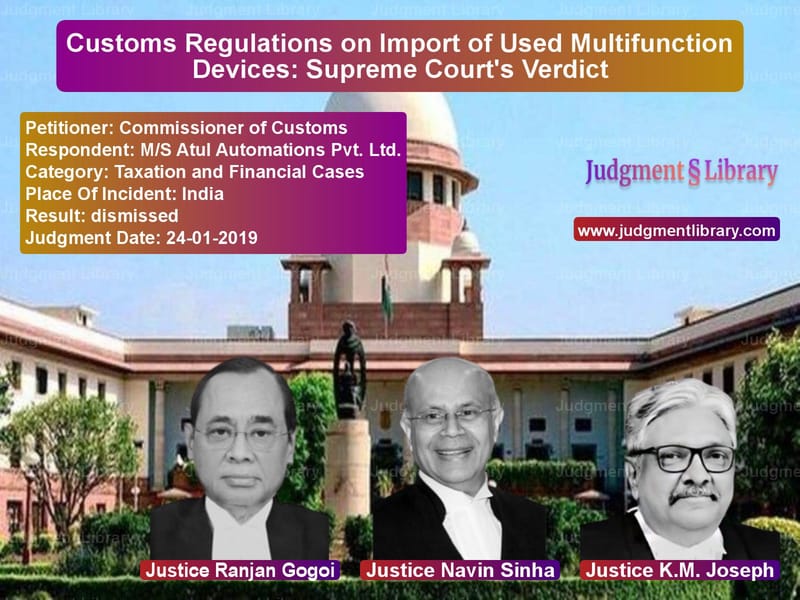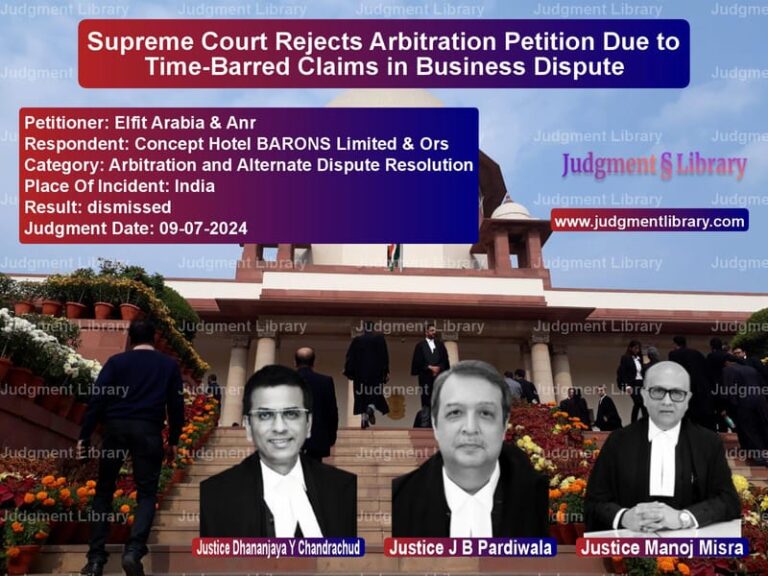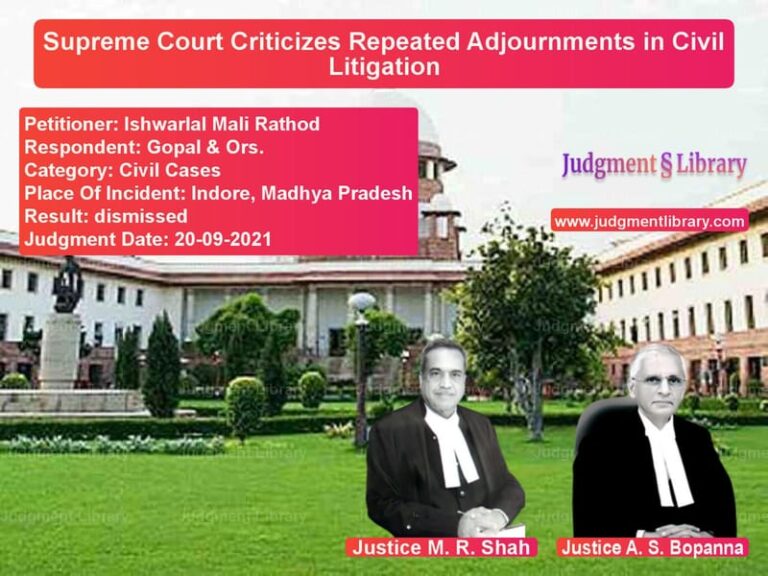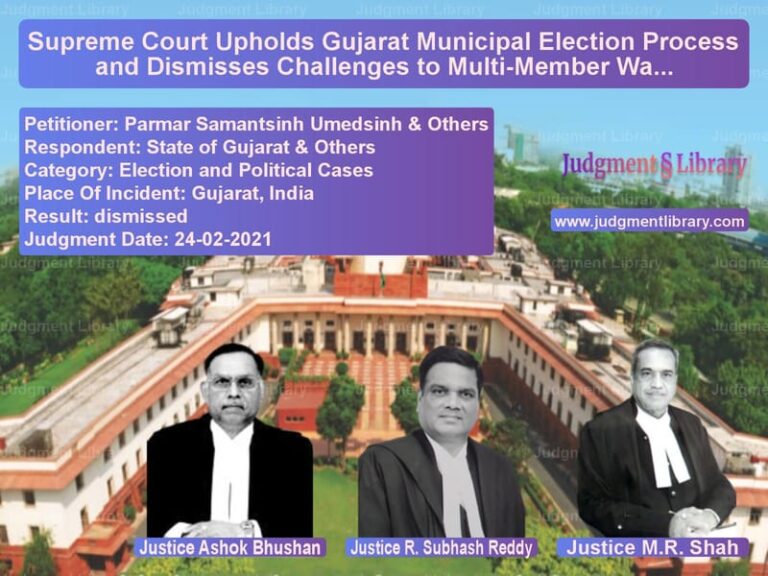Customs Regulations on Import of Used Multifunction Devices: Supreme Court’s Verdict
The case of Commissioner of Customs vs. M/S Atul Automations Pvt. Ltd. & Others revolves around the import of used Multifunction Devices (MFDs), their classification under the Foreign Trade Policy and the Waste Management Rules, and the consequences of importing restricted goods without authorization. The Supreme Court’s ruling in this matter clarifies the treatment of such imports and the balance between trade regulations and environmental concerns.
The respondents had imported consignments of MFDs in October-November 2016. The Commissioner of Customs ruled that these imports violated the Foreign Trade Policy and Rule 15(1)(2) of the Hazardous and Other Wastes (Management and Transboundary Movement) Rules, 2016. Consequently, a redemption fine was imposed, and the consignment was released only for re-export. The Customs authorities also imposed penalties under Sections 112(a) and 114AA of the Customs Act, 1962. However, the High Court later ruled in favor of the importers, leading to the present appeal.
Background of the Case
The respondents did not contest that the imports were made without the necessary authorization. However, they argued that MFDs did not constitute “waste” under the Waste Management Rules and had a utility life of 5 to 7 years. The High Court ruled in their favor, directing the release of the consignment under Section 125 of the Customs Act.
Petitioner’s Arguments
The Commissioner of Customs contended that:
- Importing MFDs without prior authorization violated the Foreign Trade Policy.
- MFDs fell under “other wastes” as defined in Rule 3(1)(23) of the Waste Management Rules, requiring compliance with Part B and Part D of Schedule III.
- The consignment was rightly detained and ordered for re-export under Rule 15 of the Waste Management Rules.
- The High Court erred in applying Section 125 of the Customs Act in this case, as the items should be considered prohibited rather than merely restricted.
Respondent’s Arguments
The importers countered these claims, arguing that:
- The Customs Department had previously allowed similar consignments to be released upon payment of redemption fines at other ports (Kolkata, Chennai, and Cochin).
- MFDs were not prohibited but restricted imports and could be cleared upon compliance with regulations.
- The Extended Producer Responsibility (EPR) requirement under the E-Waste (Management) Rules, 2016 had been deferred until April 30, 2017.
- The imported devices had a certified utility life of 5 to 7 years and were thus not immediately hazardous waste.
Supreme Court’s Observations and Ruling
The Supreme Court ruled in favor of the importers, dismissing the appeals of the Commissioner of Customs. The key observations made by the Court were:
1. Distinction Between Prohibited and Restricted Items
The Court noted:
“There will exist a fundamental distinction between what is prohibited and what is restricted.”
Since MFDs were restricted and not prohibited, their import could be permitted with certain conditions.
2. Compliance with the Waste Management Rules
The Court observed:
“The respondents have been found to be substantially compliant with Rule 13 of the Waste Management Rules read with Schedule VIII Entry 4(j).”
Thus, their import could not be deemed entirely illegal.
3. Application of Section 125 of the Customs Act
The Supreme Court upheld the High Court’s ruling that the goods could be released upon payment of a market-value fine rather than being re-exported.
“A harmonious reading of the statutory provisions of the Foreign Trade Act and Section 125 of the Customs Act will therefore not detract from the redemption of such restricted goods imported without authorization upon payment of the market value.”
4. Environmental Concerns and Utility of MFDs
The Court took into account environmental concerns and utility:
“The Chartered Engineer certified that the MFDs were capable of utility for the next 5 to 7 years without any major repairs.”
Since they were still usable, they could not be considered immediate e-waste.
5. Consistency in Customs Treatment
The Court noted the inconsistency in customs treatment at different ports and ruled that similar treatment should be extended to the current consignment.
Conclusion
The Supreme Court’s ruling provides clarity on the classification and treatment of restricted imports under Indian customs law. It affirms that:
- Restricted imports are different from prohibited imports.
- Section 125 of the Customs Act allows redemption upon payment of fines rather than mandatory re-export.
- Imports that have a certified utility life should not be automatically classified as waste.
This ruling sets a precedent for future cases involving the import of used electronic devices, balancing trade regulations with environmental concerns.
Petitioner Name: Commissioner of Customs.Respondent Name: M/S Atul Automations Pvt. Ltd..Judgment By: Justice Ranjan Gogoi, Justice Navin Sinha, Justice K.M. Joseph.Place Of Incident: India.Judgment Date: 24-01-2019.
Don’t miss out on the full details! Download the complete judgment in PDF format below and gain valuable insights instantly!
Download Judgment: Commissioner of Cust vs MS Atul Automations Supreme Court of India Judgment Dated 24-01-2019.pdf
Direct Downlaod Judgment: Direct downlaod this Judgment
See all petitions in Customs and Excise
See all petitions in Judgment by Ranjan Gogoi
See all petitions in Judgment by Navin Sinha
See all petitions in Judgment by K.M. Joseph
See all petitions in dismissed
See all petitions in supreme court of India judgments January 2019
See all petitions in 2019 judgments
See all posts in Taxation and Financial Cases Category
See all allowed petitions in Taxation and Financial Cases Category
See all Dismissed petitions in Taxation and Financial Cases Category
See all partially allowed petitions in Taxation and Financial Cases Category







